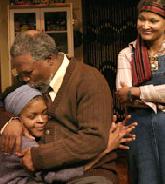SITE GUIDE
SEARCH
REVIEWS
FEATURES
NEWS
Etcetera and
Short Term Listings
LISTINGS
Broadway
Off-Broadway
NYC Restaurants
BOOKS and CDs
OTHER PLACES
Berkshires
London
California
New Jersey
DC
Philadelphia
Elsewhere
QUOTES
TKTS
PLAYWRIGHTS' ALBUMS
LETTERS TO EDITOR
FILM
LINKS
MISCELLANEOUS
Free Updates
Masthead
Writing for Us
A CurtainUp Review
Nothing But the Truth
By Elyse Sommer
|
I paid for this freedom. They must never forget
the little people like me -- who make up the
majority that has kept them in power and
will still do so for a long time to come.
We have dreams, too.
--- Sipho |

Warona Seane, John Kani, and Esmeralda Bihl
in Nothing But the Truth
(Photo: Paul Kolnik) |
If this sounds like a self-consciously structured setup, it is. However, as written by John Kani, one of South Africa's theatrical lions and long time Athol Fugard collaborator, this predictable story manages to gain warmth and dimension. Kani's portrayal of Sipho, a man dignified and soft spoken but seething with years of accumulated resentment, transcends stereotype. Esmeralda Bihl is brash yet likeable as Mandisa, the London raised niece who has brought her father's ashes to be buried in his homeland. Though she does so more slowly and less flamboyantly, Warona Seane eventually animates the role of Thando, the go-between in whom Mandisa also stirs up dormant discontent -- mainly the need to know why her mother deserted her (something her father has refused to discuss) and the yearning to explore life outside the township of New Brighton which custom forbids her doing without her father's sanction.
The container holding Sipho's brother Themba's ashes is the first signal that this isn't going to be a tranquil family reunion since to Sipho a proper burial requires a body and a coffin. Of course Sipho's distress at this to him unorthodox disposal of his brother's remains goes much deeper. Unlike Sipho's quiet and unshowy support of the struggle against Arpartheid, Themba was a charismatic if self-serving leader fled South Africa for England when he was most needed. It is Sipho's recollections of the back story of that long ago self-exile and its bitter harvest in terms of the brothers' thirty-year estrangement that is the backbone of Mr. Kani's story. Though essentially an intimate family story, Nothing But the Truth examines the ordinary South African's place in the hard-earned free society. The problems and disappointments that inevitably accompany the end of a long struggle are reflected in Sipho's coming to terms with a lifetime of having "things taken from him." Besides having to deal with the wounds opened by his brother's death, he must also accept the bitter pill of not getting the chief librarian's job he feels he has earned through many years of service and support of the freedom struggle.
In the days between Mandisa's arrival and the funeral, the litany of remembered losses pile up -- the most heart-wrenching being the death of his son (a stand-in for Kani's poet brother to whom this play is dedicated) and the disappearance of the wife he has never stopped loving. As Sipho becomes increasingly morose, the relationship between the two cousins deepens and brings additional conflict as Mandisa, a budding fashion designer, urges Thanda to visit the fashion scene in Johannesburg and London with her.
Janice Honeyman's unobtrusive direction plays to the small moments-large feelings sensibility of the script. Except for an explosive climactic monologue from Sipho, the journey from gradually revealed heartaches to redemptive acceptance, this is a quiet play brought to authentic life in the book and picture cluttered cinder block house Sarah Roberts has created for the Makhaya family. That house, the costumes (also by Roberts) put us into Port Elizabeth, South Africa circa 2000-- when the soft-spoken, sixty-three-year-old Sipho looks on a life that has run much of its course and cries out "I want everything back" he is an Everyman who could be living anywhere.
LINKS
For a review of Mr. Kahni's most recent appearance in his most famous collaboration with Athol Fugard, see The Island, reviewed in London and at BAM.
|
NOTHING BUT THE TRUTH
Written by John Kani Directed by Janice Honeyman; Cast: John Kani (Sipho Makhaya), Warona Seane (Thando Makhaya) and Esmeralda Bihl (Mandisa MacKay). Set and Costume Design: Sarah Roberts Lighting Design: Mannie Manim Running time: 1 hour and 40 minutes without intermission Mitzi E. Newhouse Theater, Lincoln Center, 150 W. 65th St. 212/239-6200 or www.lct.org Tuesday-Saturday @8PM, Wednesday & Saturday @2PM, Sunday @3PM; 11/15/03 to 1/18/04; opening 12/07/03. Tickets: $60 Reviewed by Elyse Sommer based on December 10th matinee performance |

Mendes at the Donmar
Our Review

At This Theater

Leonard Maltin's 2003 Movie and Video Guide

Ridiculous!The Theatrical Life & Times of Charles Ludlam

Somewhere For Me, a Biography of Richard Rodgers

The New York Times Book of Broadway: On the Aisle for the Unforgettable Plays of the Last Century

6, 500 Comparative Phrases including 800 Shakespearean Metaphors by CurtainUp's editor.
Click image to buy.
Go here for details and larger image.



